Ran Blu-ray Movie
HomeRan Blu-ray Movie 
StudioCanal CollectionLionsgate Films | 1985 | 162 min | Rated R | Feb 16, 2010
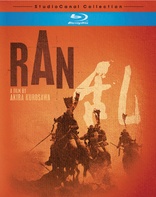
Movie rating
8.5 | / 10 |
Blu-ray rating
| Users | 2.9 | |
| Reviewer | 4.0 | |
| Overall | 3.9 |
Overview
Ran (1985)
Set in medieval Japan, an elderly warlord announces his intention to hand over his empire to his sons. A power struggle ensues between the heirs.
Starring: Tatsuya Nakadai, Akira Terao, Jinpachi Nezu, Daisuke Ryû, Mieko HaradaDirector: Akira Kurosawa
| Drama | Uncertain |
| Foreign | Uncertain |
| Period | Uncertain |
| War | Uncertain |
| Epic | Uncertain |
| Action | Uncertain |
Specifications
Video
Video codec: VC-1
Video resolution: 1080p (upconverted)
Aspect ratio: 1.82:1
Original aspect ratio: 1.85:1
Audio
Japanese: DTS-HD Master Audio 2.0
Japanese: DTS-HD Master Audio 5.1 (48kHz, 16-bit)
English: DTS-HD Master Audio 2.0 (48kHz, 16-bit)
French: DTS-HD Master Audio 2.0
German: DTS-HD Master Audio 2.0
Italian: DTS-HD Master Audio 2.0
Spanish: DTS-HD Master Audio 2.0
All are (48kHz, 16-bit)
Subtitles
English, French, German, Italian, Spanish, Danish, Dutch, Finnish, Norwegian, Swedish
Discs
50GB Blu-ray Disc
Single disc (1 BD)
Packaging
Slipcover in original pressing
Playback
Region A, B (C untested)
Review
Rating summary
| Movie | 4.5 | |
| Video | 3.0 | |
| Audio | 3.5 | |
| Extras | 4.0 | |
| Overall | 4.0 |
Ran Blu-ray Movie Review
Akira Kurosawa's epic production offers marginal improvements on Blu-ray.
Reviewed by Dustin Somner February 12, 2010Akira Kurosawa was a legend among filmmakers, and possibly the most influential director in the history of cinema. His attention to detail, sweeping scope, and lush visuals created a newfound respect for the artistry of filmmaking, while earning him attention all over the globe. Ran is considered by many film historians as the pinnacle of Kurosawa’s lengthy career, and the last epic masterpiece before his death (he was 75 at the time Ran was released, and died 13 years later). Running nearly three hours in length and using every last penny in the 12 million dollar budget, the film incorporated over 1400 extras and required the construction of an immense castle on Mount Fuji (intentionally burned to the ground during the filming of an epic castle siege). Those who love the escapism of film, but haven’t been introduced to Ran can’t fully appreciate the lasting impact of Kurosawa’s work on modern cinema, and owe themselves the favor of soaking up this masterpiece.
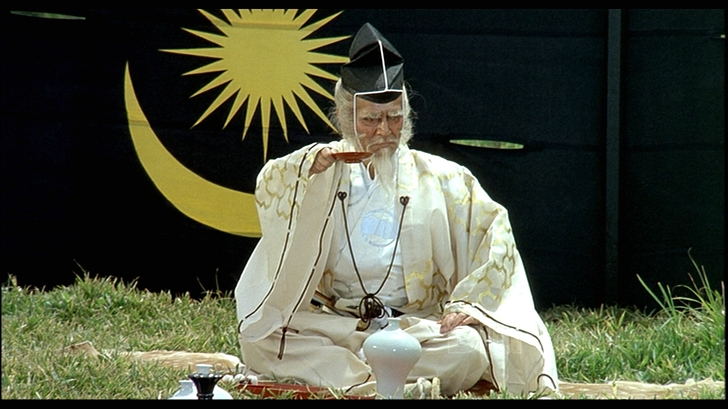
"I'd like everyone to drink their Kool-Aid at the same time."
Partially based on Shakespeare’s ‘King Lear’, Ran is set during feudal Japan, and opens with a key scene depicting the transfer of control over the powerful Ichimonji clan from the aging tyrant Hidetora (Tatsuya Nakadai) to his three sons. The eldest child, Taro (Akira Terao) will inherit the First Castle and step into his father’s shoes as leader of the clan. The second-born, Jiro (Jinpachi Nezu) will be given the Second Castle, along with the army designated to the protection of the castle’s territory. The rebellious third son, Saburo (Daisuke Ryu) is given the lowliest Third Castle, and instructed to support (along with his brother Jiro) the decisions of Taro, remaining a united front against their enemies. Saburo is unhappy with this arrangement and believes it unwise on the part of his father. He’s quickly banished from the Ichimonji clan for his insolence, and takes up refuge with the family of a rival clan. Within a short span of time, Hidetora’s logical plan of succession becomes the catalyst for a profound power struggle between himself and his two remaining sons, which threatens to destroy everything he worked so hard to obtain. Armies may bring power to their commander, but seeds of deception and greed prove a more formidable barrier to the longevity of Hidetora’s clan.
Ran is a tragic look at the worst attributes of human nature. Don’t expect happy subplots, comedic elements, or an ending with someone riding off into the sunset. Instead, prepare yourself for 162 minutes of murder, greed, betrayal, and regret. It would be simple to complete an entire essay on the motivations and flaws of each character in the twisted plot, but considering those discussions plays a key role in the replay value of the feature, I’d rather focus on the themes that form the backbone of Ran. First and foremost, this is a tale of one man’s journey toward redemption, and the consequences we must face for the sins of our past. Hidetora has committed unthinkable acts during his days as the clan leader, and remains responsible for the murder and torture of countless victims. As he grows older, he seems to think those actions will go unpunished, and he’ll simply live out his days as the respected father of the next generation. However, the wicked actions of his youth are soon visited upon him, as his rapid fall from grace leads him down the path of insanity. How troubling it is to be loved only by those you’ve wronged, and wronged by the individuals you love. If you ever think you’re having an awful day at the office, take a deep breath and remember Ran.
The second intriguing element within the construct of the plot involves the wife of Taro (the eldest son), and the vital role of Lady Kaede (Mieko Harada) in the destruction of the family. Playing her husband like a fiddle, she convinces him to take the first step in offending his father, knowing it will not sit well with Hidetora. From there, she orchestrates one menacingly brilliant move after another, which always lands her an advisory role to the various leaders of the Ichimonji clan. Her motivations are somewhat clear from the get-go, which gives the audience plenty of opportunity to witness the intricate tapestry of deception she weaves. I certainly wouldn’t want to ruin the ending for anyone who hasn’t stumbled across Ran by now, but by the time the end credits roll, Lady Kaede is as much a main character as Hidetora.
Regarding the production values of the film, there’s absolutely nothing to complain about. Filmed entirely in Japan, the sprawling backdrop of Mt. Fuji during the opening sequences of the film predicts the epic scope of what’s to come, and Kurosawa never disappoints. To say this is a visual film would be a tremendous understatement. Utilizing vivid (almost garish) colors, wide distance shots, and unique angles, every scene in Ran is an exercise in framing perfection. Kurosawa preferred to film actors from a distance and often utilized three cameras at the same time to draw the best performance from his cast. This technique proved quite valuable throughout his library of films, but Ran is perhaps the best example of the cohesion between his directing style and the cast. Much of Kurosawa’s work will stand the test of time, but Ran will always be his crowning achievement.
Ran Blu-ray Movie, Video Quality 
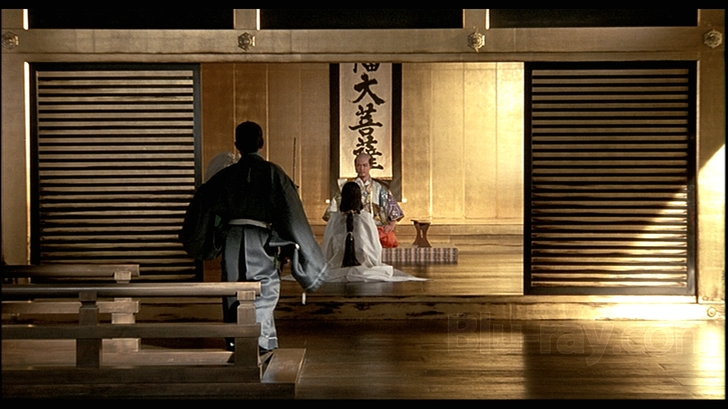
Presented in 1080p utilizing the VC-1 codec (at an average bitrate of 17Mbps), Ran doesn't quite offer the upgrade I was hoping for, but perhaps my expectations were set a bit too high. First and foremost, detail seems lacking for a high-definition rendering of such a visual film. Kurosawa demonstrates painstaking efforts in designing and capturing several large-scale scenes, but the limitations of the source material prevent fine textures from revealing themselves. For example, look at the blades of grass during the initial sequences that follow the boar hunt. There's certainly an elevated level of clarity over the standard definition offering, but not the striking improvement we've grown accustomed to seeing in films of this vintage. Aside from marginal gains in detail, the color palette looks exceptional, with bright reds, yellows and blues. If my memory serves me correctly, this is a bit brighter than I recall, but I wouldn't go so far as to suggest there was the slightest degree of tampering. On the unfortunate downside, some of the medium-distance shots are marred by noticeable edge-enhancement, which has a tendency to play with the smooth characteristics of the image. At times it becomes difficult to differentiate between the presence of edge-enhancement and color fringing around certain objects (the effect is also present in the Studio Canal release of The Ladykillers), but the two problems collectively downgrade the attractiveness of the picture.
In the end, fans of Ran shouldn't expect a revelatory experience with this transition to high-definition. Film grain is more prevalent on this release compared with prior versions (which is a good thing), and the coloring is far superior to the prior Criterion DVD release, but I was still somewhat let down by the lack of a dramatic upgrade in clarity. So long as you temper your expectations accordingly, you'll likely find the presentation acceptable.
Ran Blu-ray Movie, Audio Quality 
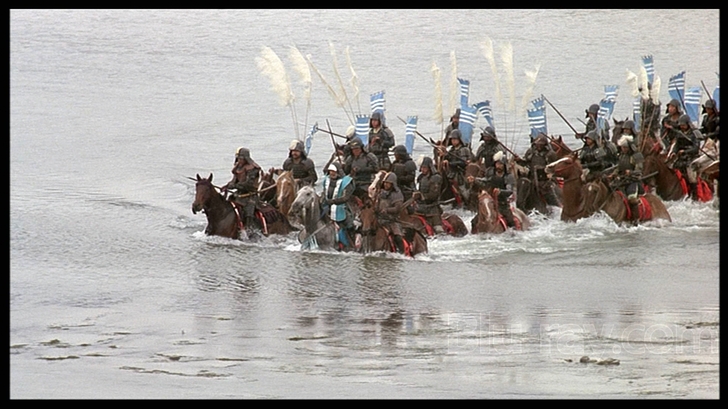
The multi-channel lossless mix improves matters somewhat, but I still found myself slightly underwhelmed with certain aspects of the track. Ran is a sweeping epic, and during those moments of elevated action the production values in the sound department create a truly rousing experience. Likewise, the thunderous musical score by Toru Takemitsu is spread equally throughout the sound stage, enhancing the sense of immersion in the emotional tidal waves of his compositions. Unfortunately, as mentioned before, not all is well with the perceived upgrade. First, I noticed a distinct 10 second period of intermittent static during the siege on Third Castle (around the 1:08 mark of the film). This isn't the type of crackle that reflects the licking flames emerging all around Hidetora, but rather a distortion effect that I don't recall in prior viewings (I wish I had the DVD handy to complete a comparison). The other slight problem I had with the multi-channel track is some oddly unbalanced environmental effects emanating from the rear sound stage. The majority of the feature contains accurate levels, but there's one scene in particular where the crickets are downright intrusive. In my personal opinion, the most impressive audio tracks are those that immerse a viewer without drawing their attention away from the onscreen action. Unfortunately, that's not always the case with the separation and balance in Ran, leading to a slight degree of disappointment.
Despite some minor qualms, this is still a fine audio experience with positives that far outweigh the negatives.
Ran Blu-ray Movie, Special Features and Extras 

For the most part, the supplemental package on the disc mirrors the prior Criterion DVD release, though the audio commentary by Stephen Price and the visual feast titled "Image: Kurosawa's Continuity" are missing (likely due to licensing issues).
AK (480p, Dolby Digital 2.0, 1:11:32 min): This lengthy documentary captures behind-the-scenes footage from the set of Ran, with subtitled narration to clue us in on what's taking place. The primary fascinating aspect of the featurette offers an intimate look at Kurosawa's directing style, and his extreme focus on perfection. The legendary director serves as acting coach, art director, set designer, and cinematographer, as he attempts to keep his hands in every aspect of the production.
Akira Kurosawa: The Epic and the Intimate (480p, Dolby Digital 2.0, 41:49 min): Consisting mainly of interviews (French language with English subtitles), this supplement addresses the collaborative effort of Kurosawa and producer Serge Silberman in making Ran a reality. The topics of discussion eventually move beyond the production and delve into the themes of the film and directing style of Kurosawa.
The Samurai (480p, Dolby Digital 2.0, 52:47 min): aside from the annoyance of watching an image that's stretched to fill a widescreen display, this modern day documentary on the history of the Samurai and their incorporation in modern cinema is quite entertaining. It's not nearly as interesting as the prior featurettes on the disc, but remains worthwhile for a single viewing (English language).
Art of the Samurai (480p, Dolby Digital 2.0, 41:11 min): Samurai historian Jean-Christophe Charbonnier provides an extensive analysis of ancient Japanese weaponry and armor, while brief clips from Ran are shown as an example of various topics. Charbonnier can be a bit dry in his delivery, so I'd recommend you keep a cup of coffee handy.
Rounding out the extras, we have a standard definition trailer for Ran.
Ran Blu-ray Movie, Overall Score and Recommendation 
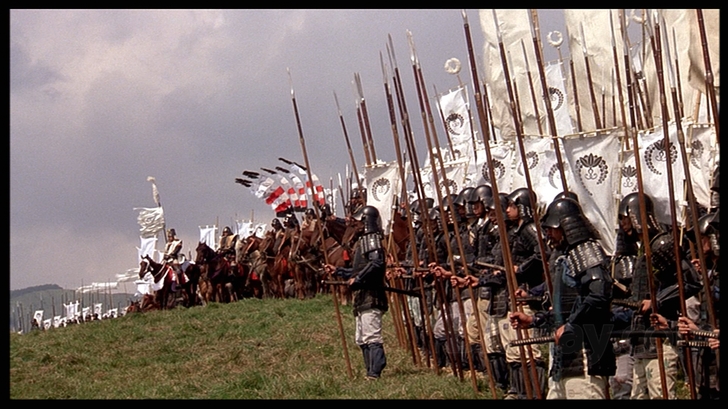
I wish I could say the new Blu-ray edition of Ran is the definitive version of an iconic masterpiece, but I'm afraid I was left slightly underwhelmed. I wholeheartedly believe it surpasses prior editions in every way, and might go so far as to conclude this is the best the film will ever look, but I can't shake the nagging hope that someday we'll witness the results of a dramatic restoration effort. After all, if Paramount could rescue The Godfather films, there's reason to believe the same effort might eventually land on this classic. Having said that, I doubt a restoration is anywhere on the foreseeable horizon, and Ran deserves a spot on the shelf of any serious film fan. Count this reviewer in for a lukewarm recommendation.
Similar titles
Similar titles you might also like

Kagemusha
影武者
1980

Throne of Blood
蜘蛛巣城 / Kumonosu-jô
1957

Seven Samurai 4K
七人の侍 / Shichinin no samurai
1954

Harakiri
切腹 / Seppuku
1962

The Human Condition I: No Greater Love
人間の條件 / Ningen no jôken / Parts 1 and 2
1959

Curse of the Golden Flower
满城尽带黄金甲 / Man Cheng Jin Dai Huang Jin Jia
2006

Sansho the Bailiff
山椒大夫 / Sanshô dayû
1954

Hara-Kiri: Death of a Samurai
一命 / Ichimei
2011

Ashes of Time
東邪西毒 / Dung che sai duk / Ashes of Time Redux
1994

In the Fog
V tumane
2012

Red Beard
赤ひげ / Akahige
1965

The Sword of Doom
大菩薩峠 / Dai-bosatsu tôge
1966

The Human Condition II: Road to Eternity
人間の條件 / Ningen no jôken / Parts 3 and 4
1959

Shadow
影
2018

Goemon
ゴエモン
2009

The Painted Bird
Nabarvené ptáce / Slipcover in Original Pressing
2019

Black Book
Zwartboek
2006

Come and See
Иди и смотри / Idi i smotri
1985

The Leopard
Il gattopardo / Italian and American Versions
1963

Beanpole
Дылда / Dylda
2019
